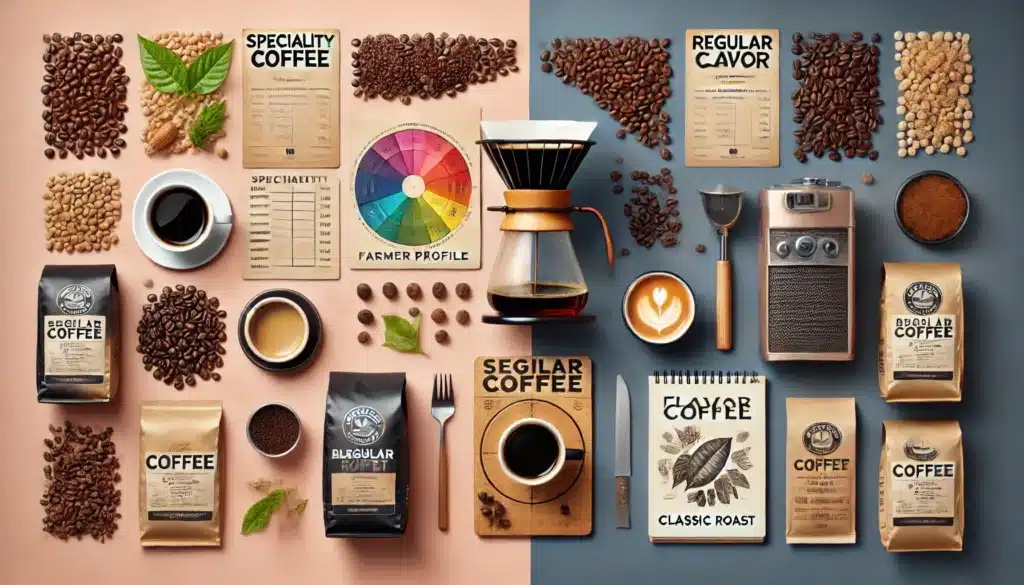Not all coffee is created equal. While both specialty and regular coffee come from the same plant species, the way they’re grown, processed, roasted, and brewed can be worlds apart. For those who want to truly appreciate coffee’s full potential, understanding the difference is essential.
In this guide, we’ll break down what sets specialty coffee apart from the everyday cup, and why it matters — for your palate and for the planet.
1. What Is Specialty Coffee?
Specialty coffee refers to high-quality coffee that scores 80 points or more on a 100-point scale by certified tasters (Q-graders).
It is:
- Carefully grown in ideal climates
- Harvested and processed with precision
- Evaluated for flavor, acidity, balance, and cleanliness
Specialty coffee emphasizes quality at every stage, from seed to cup.
2. What Is Regular (Commercial) Coffee?
Regular coffee, also called commodity coffee, is typically:
- Grown for volume, not quality
- Mechanically harvested
- Roasted dark to mask inconsistencies
- Sold in supermarkets or vending machines
The focus is on affordability and mass production, often sacrificing flavor and traceability.
3. Flavor and Complexity
Specialty coffee offers a wide range of flavors — from floral Ethiopian Yirgacheffe to chocolatey Brazilian beans.
It can feature:
- Fruity acidity
- Floral aromas
- Balanced sweetness and body
Regular coffee tends to have:
- Flat or bitter taste
- Lack of complexity
- Ashy or burnt notes, especially in dark roasts
4. Traceability and Transparency
Specialty coffee is usually traceable to the farm or cooperative, with information like:
- Origin country and region
- Altitude
- Variety and processing method
- Farmer or cooperative name
In contrast, regular coffee is often a blend of unknown origins, with no transparency.
5. Farming and Sustainability
Specialty producers often use:
- Selective handpicking of ripe cherries
- Eco-friendly practices
- Shade-grown methods to protect biodiversity
Regular coffee farming may involve:
- Clear-cutting forests
- Overuse of pesticides
- Low wages and little reinvestment in communities
6. Roasting Philosophy
Specialty coffee is roasted to highlight natural flavors, often light or medium roast to preserve origin notes.
Regular coffee is often:
- Dark roasted for uniformity
- Meant for consistency, not character
- Sometimes pre-ground long before brewing
7. Price and Perceived Value
Specialty coffee costs more, but for good reason:
- Higher quality beans
- Fairer wages for farmers
- Small-batch roasting and direct trade
Regular coffee is cheaper but may include:
- Lower-grade beans
- Additives or fillers
- Little profit going to producers
8. Brewing and Freshness
Specialty coffee is usually:
- Freshly roasted and sold in small batches
- Brewed with care using pour-over, AeroPress, or espresso
- Paired with grind-to-order recommendations
Regular coffee is often:
- Pre-ground and shelf-stable for months
- Brewed with little attention to ratio or freshness
9. Who Drinks What?
Specialty coffee attracts:
- Curious, quality-seeking drinkers
- Home brewers and enthusiasts
- People who value ethical sourcing
Regular coffee is often chosen by:
- Budget-conscious consumers
- Those who prefer consistency and convenience
- Office or bulk buyers
10. Why It Matters
Choosing specialty coffee means:
- Supporting better farming practices
- Enjoying higher quality and flavor
- Participating in a more ethical and transparent supply chain
It’s more than just a beverage — it’s a statement about what kind of coffee world you want to support.
Final Thoughts: Beyond the Cup
The difference between specialty and regular coffee goes far deeper than taste. It’s about attention to detail, respect for people and the environment, and the desire to elevate coffee from commodity to craft.
Your choice matters — and with every sip, you can experience the difference.







